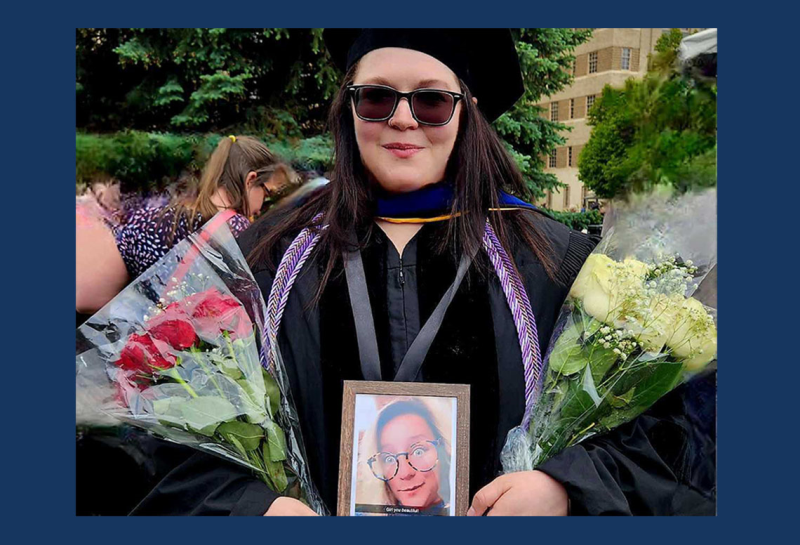
In recognition of her recent academic achievement, CEUfast is proud to spotlight Dr. Desiree Reinken, PhD, APRN, NP-C, who successfully completed her Doctor of Philosophy in Nursing Research in May 2025. Dr. Reinken, a full-time Nurse Planner and author at CEUfast, has combined years of clinical experience with advanced research to further contribute to the nursing profession. Her dissertation, which examined quality of life in glioblastoma patient-caregiver dyads, reflects her commitment to advancing nursing science and supporting both patients and caregivers.
In the Q&A below, Dr. Reinken shares insights into her doctoral journey, research findings, and advice for fellow nurses pursuing advanced education.
1. What inspired you to pursue your PhD in nursing?
I thought I was done after earning my Masters degree until a conversation with my best friend during her chemotherapy appointment changed everything. Through our conversations and her resilience, I realized that there was more I could do for nursing and for others.
2. Why did you choose to focus your research on glioblastoma and patient-caregiver dyads?
At that chemotherapy appointment, I met a preacher diagnosed with a brain tumor who was experiencing uncertainty about his diagnosis. It highlighted the fact that this lethal diagnosis does not discriminate, and it triggers emotions that can be detrimental to health and quality of life. After I delved into more research, I realized the gaps in care that existed for the caregiver and the patient-caregiver dyad as a whole.
3. What were some of the key findings or takeaways from your dissertation? How do you see your research making a difference in clinical practice?
There were some really interesting findings from this secondary analysis. First, the study indicated temporal variability or heterogeneity. This may mean that patients and caregivers would benefit from interventions that are phase-specific, such as timed interventions, versus fixed interventions that do not change over time.
Also, there were correlations between neuropsychological status and quality of life in patients. By understanding this connection, providers would gain a holistic understanding of quality of life, including aspects of cognitive, psychological, social, and emotional functioning.
Finally, it was found that religion and spirituality were closely related to other protective factors in the caregiver, such as caregiver mastery. Currently, most interventions are not targeted toward addressing spirituality in patients with glioblastoma or their caregivers.
4. Youve shared that you plan to continue your work in nurse planning and research as a nurse scientist. What draws you to that path, and what excites you most about it?
I am drawn to this path as there are so many theoretical, educational, and clinical gaps surrounding a glioblastoma diagnosis and how it affects the dyad. I am so excited to explore quality of life using innovative methods to gain a deeper understanding of the lived experience of this diagnosis. The opportunity to make a meaningful impact on this population is a profound honor that I am passionate about.
5. What advice would you give to other nurses considering a PhD or advanced degree?
It is important to have a solid understanding of why you are choosing to pursue an advanced degree. When you are feeling unmotivated or disengaged, this will be a helpful reminder to focus on. Also, it is important to embrace the uncertainty of this journey and recognize the strength of your voice and your potential to make significant impacts.
About CEUfast, Inc.
Founded in 2002 by nurses, for nurses, CEUfast is an accredited provider of continuing education for healthcare professionals. With a focus on quality and convenience, CEUfast offers a wide range of online CE courses that are accepted by virtually every state. CEUfast is an ANCC-accredited provider and is committed to improving patient outcomes through ongoing continuing education.

